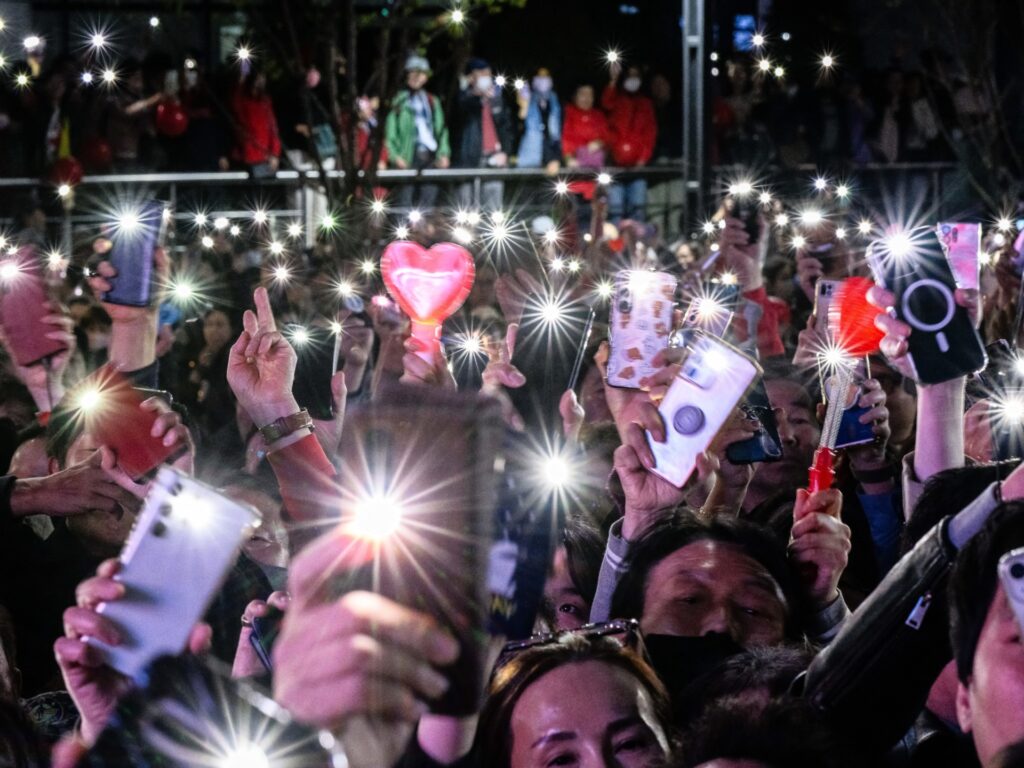Exit polls in South Korea’s midterm elections on Wednesday predicted a landslide win for the left-wing Democratic Party (DP) and its “sister party,” the Democratic United Party (DUP).
South Korean voters seem displeased with all parties as the economy stumbles, but they are focusing their ire on President Yoon Suk-yeol, who they view as out-of-touch with their concerns.
If the exit polls are accurate – which is not always the case in South Korea – the left-wing DP/DUP coalition will take between 168 and 193 seats out of 300 at stake in the National Assembly, leaving Yoon’s People Power Party (PPP) and its ally, the People Future Party (PFP), with 87-111 seats.
According to these exit polls, turnout for the election reached 67 percent, the highest level for a midterm election since 1992.
South Korea has an offbeat legislative system in which only 254 of the 300 seats are filled by direct elections from various districts. The other 46 seats are filled by “proportional representation.” Every voter receives two ballots: one for the individual candidates running in their district, and the other for a party they favor. The party ballots are tallied, and then the 46 proportional seats are divvied up according to how many votes they received.
This unusual approach, implemented in the 2020 election under the DP administration of President Moon Jae-in, was ostensibly intended to make it possible for smaller parties running on national platforms to gain some seats. The proportional seats also have a gender quota that requires at least half of the candidates to be female. Cynics suspected it was actually a ploy by the DP to dilute the opposition vote.

Supporters raise their phone torches during a campaign rally for South Korea’s ruling People Power Party (PPP), on the eve of the parliamentary elections in Seoul on April 9, 2024. (Photo by Anthony WALLACE / AFP)
The end result of the 2020 election changes is that every big party in South Korea now spins off little “satellite” parties to grab a piece of the proportional representation pie, leaving South Korean voters to wrestle with comically huge ballots. Twenty-one parties were registered for the district elections, plus another 38 parties registered for the proportional seats.
PPP leader and likely 2027 presidential candidate Han Dong-hoon seemed to find the exit polls credible, as he issued a gloomy statement on Wednesday: “The People Power Party did its best to do politics that uphold the will of the people, but the exit poll results are disappointing. We will watch the results of vote counting until the end.”
Yoon may have driven the final nail into his party’s coffin with a spectacular gaffe on March 18, when he visited a grocery store in Seoul to check on rising consumer prices, and casually remarked that green onions, which are widely used in Korean cuisine, seemed to be selling for a “reasonable price.”
In reality, the store Yoon was visiting had placed green onions on a special deep discount and the price of scallions was also temporarily reduced nationwide by a heavy government subsidy.
Opposition politicians, the media, and disgruntled social media users pounced, proclaiming Yoon to be utterly out of touch with the results of his policies, and a “green onion” political firestorm erupted.
The issue was so huge that election officials banned green onions from being displayed near polling places, because the opposition turned them into an ubiquitous symbol of disdain for Yoon and his party.
A cottage industry of green onion-themed clothing and accessories quickly developed, ranging from keychains to headbands. Voters made a habit of posting social media photos of themselves brandishing green onions after they emerged from voting booths, using a hashtag called #greenonions875won. (875 won, or about 65 cents, was the price Yoon said was reasonable for scallions when he visited the Seoul grocery store).
Yoon had some other problems before his fateful trip to the grocery store, including a controversy over his wife Kim Keon-hee allegedly accepting the gift of a $2,200 Dior luxury bag in September 2022 – a political “bombshell,” as one South Korean analyst described it, that was dropped by unveiling a previously secret spy video three months before the election.
Kim, a stunning beauty and energetic political activist who was once counted as a major asset to her husband’s political campaigns, has not been seen in public since mid-December. One of the running jokes online is that angry voters are bringing green onions to the polls to show their contempt for Yoon because they cannot afford to bring Dior handbags.
Yoon’s other big public relations calamity was his trip to the United States in late 2022, during which he was caught on a hot mike using foul language after a meeting with President Joe Biden.
Yoon’s office scrambled to explain what he actually meant in the hot mike snippet, in which he remarked it would be “embarrassing” for Biden if “those idiots in the legislature don’t approve” a $6 billion U.S. contribution to an international campaign against AIDS, tuberculosis, and malaria.
Yoon used a word for “idiots” that can also be interpreted as “bastards,” and he seemed to be directing that epithet at members of the U.S. Congress, although his office claimed he was actually condemning his opponents in the South Korean legislature as either idiots or bastards.
This explanation did not make anyone in the South Korean opposition feel better about the incident, while the general public was dismayed because South Korean culture places a high value on good manners and decorum.
South Korean political analysts said on Wednesday that Yoon’s public relations gaffes exacerbated voter anger about the economy, the clearly dominant issue in the election, and made it easy for the opposition to focus public outrage on the sitting president and his party. The green onion scandal seems to have killed any momentum Yoon was gaining from his showdown with striking South Korean doctors, for example, a political contest that Yoon appears to be winning.
However, the DP and its allies have their own corruption scandals and face their share of public anger over soaring inflation, leading to speculation that new parties could gain momentum ahead of the next election. Former justice minister Cho Kuk and his Rebuilding Korea party are polling in a dead heat with the major parties in the race for proportional seats, even though the party was only formed four weeks ago.
“If the opposition parties gain a significant number of seats … Yoon regime’s system will be shaken, and cracks will appear. The People Power party will be divided. The president will become a lame duck, and then a dead duck,” Cho chortled on election day.
Everyone had fun with the green onions, but voters also said South Korean politics has become too vicious and tribal, and they expressed a desire for their politicians to work together on issues like the economy. DP leader Lee Jae-myung was stabbed in the neck in January while touring a new airport in the city of Busan, prompting discussions about how vitriolic political debates have become.
The Associated Press (AP) predicted Wednesday’s election could make Yoon a “lame duck for his remaining three years in office,” as the opposition gains enough legislative power to block every move he makes, or even impeach him.

COMMENTS
Please let us know if you're having issues with commenting.